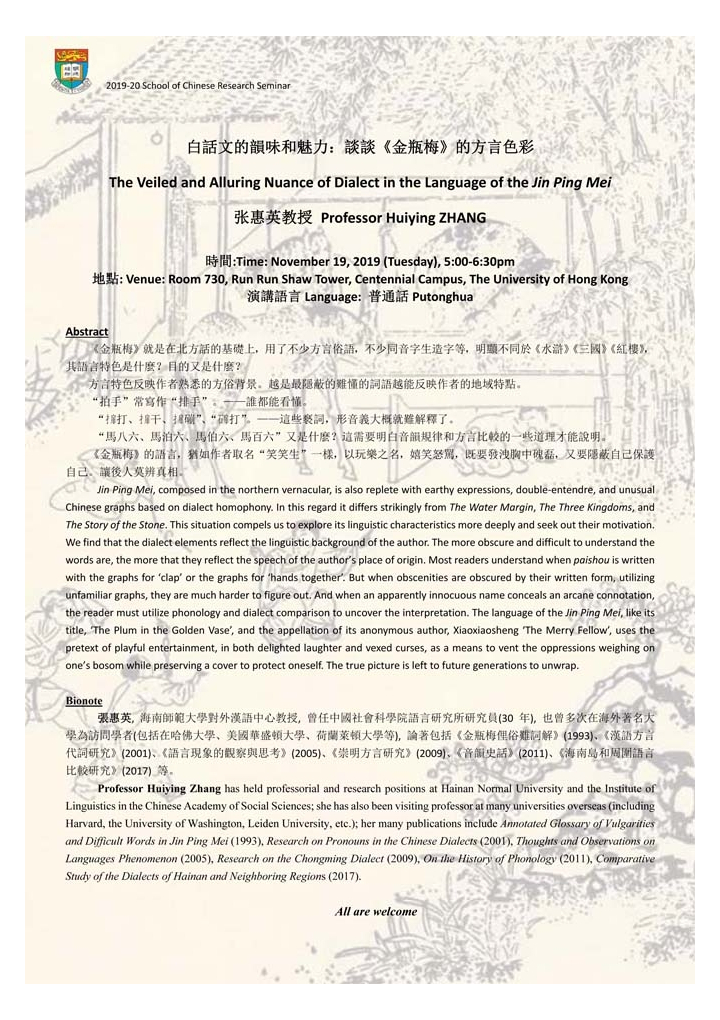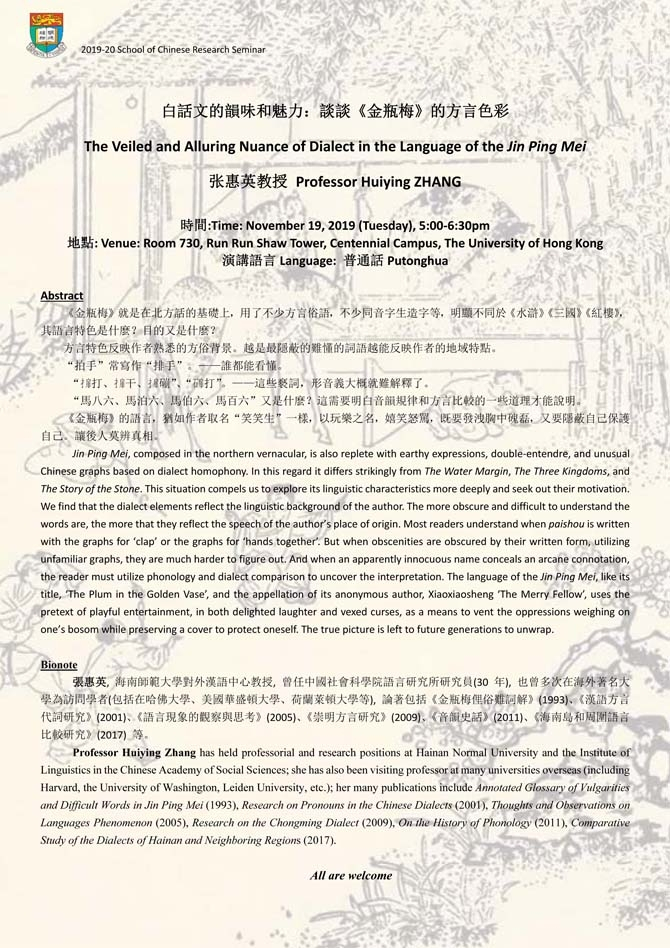[Cancellation of the seminar] The Veiled and Alluring Nuance of Dialect in the Language of the Jin Ping Mei

Please note that the below seminar is cancelled.
2019-20 School of Chinese Research Seminar
白話文的韻味和魅力:談談《金瓶梅》的方言色彩
The Veiled and Alluring Nuance of Dialect in the Language of the Jin Ping Mei
张惠英教授 Professor Huiying ZHANG
時間 Time: November 19, 2019 (Tuesday), 5:00-6:30pm
地點 Venue: Room 730, Run Run Shaw Tower, Centennial Campus, The University of Hong Kong
演講語言 Language: 普通話 Putonghua
Abstract
《金瓶梅》就是在北方話的基礎上,用了不少方言俗語,不少同音字生造字等,明顯不同於《水滸》《三國》《紅樓》,其語言特色是什麼?目的又是什麼?
方言特色反映作者熟悉的方俗背景。越是最隱蔽的難懂的詞語越能反映作者的地域特點。
“拍手”常寫作“排手”。——誰都能看懂。
“扌扉打、扌扉干、扌扉磞”、“石扉打”。——這些褻詞,形音義大概就難解釋了。
“馬八六、馬泊六、馬伯六、馬百六”又是什麼?這需要明白音韻規律和方言比較的一些道理才能說明。
《金瓶梅》的語言,猶如作者取名“笑笑生”一樣,以玩樂之名,嬉笑怒罵,既要發洩胸中磈磊,又要隱蔽自己保護自己。讓後人莫辨真相。
Jin Ping Mei, composed in the northern vernacular, is also replete with earthy expressions, double-entendre, and unusual Chinese graphs based on dialect homophony. In this regard it differs strikingly from The Water Margin, The Three Kingdoms, and The Story of the Stone. This situation compels us to explore its linguistic characteristics more deeply and seek out their motivation. We find that the dialect elements reflect the linguistic background of the author. The more obscure and difficult to understand the words are, the more that they reflect the speech of the author’s place of origin. Most readers understand when paishou is written with the graphs for ‘clap’ or the graphs for ‘hands together’. But when obscenities are obscured by their written form, utilizing unfamiliar graphs, they are much harder to figure out. And when an apparently innocuous name conceals an arcane connotation, the reader must utilize phonology and dialect comparison to uncover the interpretation. The language of the Jin Ping Mei, like its title, ‘The Plum in the Golden Vase’, and the appellation of its anonymous author, Xiaoxiaosheng ‘The Merry Fellow’, uses the pretext of playful entertainment, in both delighted laughter and vexed curses, as a means to vent the oppressions weighing on one’s bosom while preserving a cover to protect oneself. The true picture is left to future generations to unwrap.
Bionote
張惠英, 海南師範大學對外漢語中心教授, 曾任中國社會科學院語言研究所研究員(30年), 也曾多次在海外著名大學為訪問學者(包括在哈佛大學、美國華盛頓大學、荷蘭萊頓大學等), 論著包括《金瓶梅俚俗難詞解》(1993)、《漢語方言代詞研究》(2001)、《語言現象的觀察與思考》(2005)、《崇明方言研究》(2009)、《音韻史話》(2011)、《海南島和周圍語言比較研究》(2017) 等。
Professor Huiying Zhang has held professorial and research positions at Hainan Normal University and the Institute of Linguistics in the Chinese Academy of Social Sciences; she has also been visiting professor at many universities overseas (including Harvard, the University of Washington, Leiden University, etc.); her many publications include Annotated Glossary of Vulgarities and Difficult Words in Jin Ping Mei (1993), Research on Pronouns in the Chinese Dialects (2001), Thoughts and Observations on Languages Phenomenon (2005), Research on the Chongming Dialect (2009), On the History of Phonology (2011), Comparative Study of the Dialects of Hainan and Neighboring Regions (2017).
All are welcome









